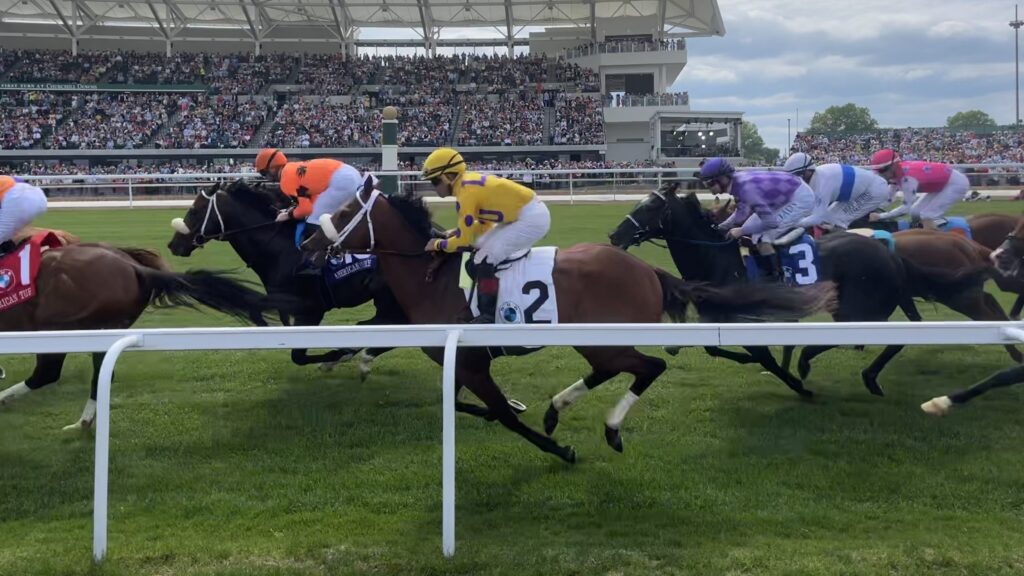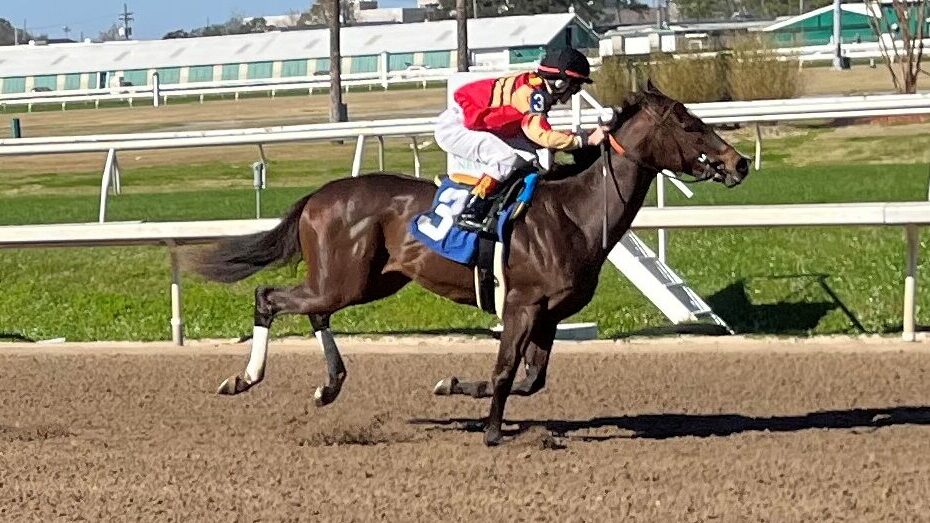Last updated: September 26, 2024
When I go to horse races with friends who’ve never been, they always ask about the different types of races. They find it fun but a bit confusing. So, I wrote this article to make it easy for everyone to understand.
There are three main kinds of horse races: allowance races, where horses carry different weights; claiming races, where horses can be bought; and stakes races, with the best horses and big prizes. Understanding the differences can make your time at the races more exciting and might even help you bet smarter.
Ready to learn more? Let’s dive in!

Understanding Claiming Races: Strategy and Decision-Making
Claiming races allow horses to be bought at a predetermined price before the race begins. The track provides a list of claiming races, typically from $5,000 to $50,000. Owners and trainers choose races that offer their horses the best chances of winning, balancing potential earnings against the risk of losing the horse to another buyer.
How Claiming Races Work
Before the race, owners evaluate which claiming price bracket fits their horse best based on past performance and current condition. For example, entering a horse in a lower-priced race might increase its chances of winning but also raise the likelihood of the horse being claimed by another owner. This decision-making is crucial as it directly impacts potential earnings and the strategic management of a racing team’s assets.
Owner Strategy Explained
Choosing the right race involves strategic planning. For instance, a horse that doesn’t perform well in higher-priced claiming races may do better at a lower level. I own a horse that struggled in $20,000 claiming races but won when I entered her in a $10,000 race. While this move brought anxiety over possibly losing her to another buyer, it was necessary to give her a chance to succeed and earn prize money.
Cautionary Tale: The Risk of Maiden-Claiming Races
My friend had a three-year-old horse that was fast and well-bred. This horse hadn’t raced yet but looked really promising in training. Usually, a horse like this would start in a maiden allowance race, where other owners can’t buy it. But, on his trainer’s advice, my friend entered the horse in a $20,000 maiden claiming race.
Unfortunately, another owner claimed my friend’s horse for $20,000 during its first race. This price was much lower than the horse’s worth, especially since it went on to win more races and money later on.
The Lesson This story teaches us that choosing where to race your horse matters. Maiden claiming races might seem good because they can lead to quick earnings, but you risk losing a valuable horse for less money. Owners must consider their horse’s potential and long-term value before entering a claiming race.
Advice for Horse Owners: If your horse has a lot of potential, consider starting in maiden allowance races that protect its value. Sometimes, it’s better to skip quick gains to avoid big losses. Check out this article about champion horses that ran in claiming races.
Navigating the Risks and Rewards
The dynamic nature of these races requires savvy decision-making. For example, when I entered my horse in a lower-priced claiming race, the risk of losing her was worth the potential win—demonstrating the calculated risks owners often take. Similarly, my friend’s experience with his promising young horse is a cautionary tale about the potential downsides of such decisions.
Why Claiming Races Are Popular
Claiming races are a critical part of the racing world because they balance the competition and keep it exciting. They offer strategic opportunities for immediate financial gains and thoughtful long-term career planning for horses. Understanding these races helps owners make informed decisions that best suit their goals and the well-being of their horses.

Understanding Allowance Races: Strategic Entry and Balancing Competition
Allowance races are like the middle children of horse racing. They’re not quite as open as claiming races and not as exclusive as stakes races. The horses carry a specified weight in these races, but some allowances exist to even the playing field.
Choosing the Right Race Picking the right allowance race is crucial. You want to find a race where your horse can compete well without being outclassed. For example, a horse with a few small wins might do better in a lower-level allowance race rather than jumping into a tougher one immediately.
The Benefits of Racing in Allowance Races These races are great for developing horses. They offer a chance to compete against similar horses without risking losing your horse, as in claiming races. This safer environment is perfect for getting horses ready for bigger challenges.
A Real-World Example: I know an owner who avoids claiming races because he fears losing his horse. He consistently enters his horse in allowance races. However, despite this safety, the competition is too tough, and the horse has never finished better than fifth. This has led to no earnings and illustrates the risk of not matching the race to the horse’s capabilities.
Advice for Horse Owners: If you have a promising horse, start it in allowance races. Make sure the race fits your horse’s current condition and readiness. It’s better to gradually move up as your horse gains experience and confidence.
Why Allowance Races Are Vital Allowance races are crucial for building a horse’s career. They act as a stepping stone from beginner levels to top-tier races. Participating in these races helps horses develop the necessary skills in a controlled environment, setting them up for success.

Stakes Races
Stakes races are elite racing events featuring the best horses and substantial prize money. Owners typically pay a fee to enter, but horses must also qualify based on their past performance—like how much money they’ve won or the number of races they’ve won.
These races are organized into grades, with Grade 1 being the highest level, such as the Kentucky Derby. Winning a stakes race can significantly boost a horse’s value. I currently own a horse that might qualify for a stakes race this season.
The Prestige of Stakes Races
Stakes races are prestigious for the horses and their owners, trainers, and jockeys. Winning a stakes race can be a crowning achievement, boosting a horse’s reputation and value and often leading to lucrative breeding opportunities. It’s the big leagues where dreams can come true, and fortunes can be made.
How Stakes Races Differ from Claiming and Allowance Races
There’s no claiming in stakes races, and weight allowances are rare. The focus is on pure competition among top-tier horses. Unlike allowance races, which aim for balance, or claiming races, which add a trading twist, stakes races are about finding the best horse on that given day. It’s pure racing excitement, a true test of skill and speed.
Strategies for Success in Stakes Races
Success in stakes races requires a blend of talent, training, and strategy. Owners, trainers, and jockeys must know their horse’s strengths and weaknesses and plan accordingly. For bettors, understanding a horse’s past performance, the competition level, and the specific conditions of a stakes race can be key to placing a winning bet.
Stakes races are the pinnacle of horse racing, where the highest stakes and the brightest spotlights shine. Whether you’re an owner dreaming of glory, a fan cheering on your favorite horse, or a bettor looking for a big win, stakes races offer the ultimate in horse racing excitement.
The roar of the crowd, the thunder of hooves – nothing quite like it. Want to feel the thrill? Join the race, and may the best horse win.

Betting Tips: Understanding Race Changes and Class Drops
Knowing when horses move to different races or drop to a lower class can help you make smarter bets. Here’s what you need to watch for:
Changes Between Race Types
- From Allowance to Stakes: Sometimes, a horse moves from an allowance race to a stakes race. These horses might get better odds because they’re not well-known in the tougher race. This could be a good chance to place a winning bet.
- From Higher to Lower Races: If a good horse enters a lower-level race, like from stakes to claiming, it might be because the owner thinks it will easily win. Keep an eye on these horses because they often do well.
Drops in Class Within Claiming Races
- Big Drops in Price: In claiming races, watch for horses that drop from a high price to a much lower one. This could mean the horse isn’t doing well lately, or the owner wants to sell it quickly. Either way, these horses can sometimes surprise everyone and win.
- Check the Odds: Horses that drop down in class often have better odds because people think they’re stronger than the others. Always look into why a horse’s odds are high or low. It could tell you if it’s a good bet or not.
Understanding these moves—whether a horse is entering a tougher race or dropping to an easier one—can help you make better betting decisions. Remember, knowing why these changes happen is as important as seeing them happen.

FAQs
What are the different classes in horse racing?
In horse racing, the main classes are maiden races for newcomers, claiming races where horses can be bought, allowance races with specific weight rules, and stakes races for top-quality horses. These classes offer various competition levels and strategies, creating a diverse and exciting sport.
What is the highest-grade horse race?
The highest grade of horse race is a Grade 1 (or Group 1 in some countries) stakes race. These races feature the highest-quality horses and are considered the most prestigious events in the sport, often attracting top jockeys, trainers, and thoroughbreds.
What is a maiden horse race?
A maiden horse race is an event for horses that have never won a race. It’s often where young or inexperienced horses begin their racing careers. These races allow emerging talent to gain experience and prove themselves on the racetrack.

Conclusion: Guide to Horse Races
Horse racing is more than just speed; it’s a game of intellect, strategy, and understanding. From the nuanced balance of allowance races to the trading dynamics of claiming races and the elite competition of stakes races, every race type offers a unique thrill. Understanding these differences opens a new dimension of enjoyment for fans and bettors.
The complexities of horse racing are what makes it such a fascinating sport. It’s not just about who crosses the finish line first; it’s about the strategy, the skill, the calculated risks, and the unpredictable outcomes. It’s a sport that invites deep engagement, rewards insight, and offers endless excitement.
With this newfound understanding, you’re a spectator and a part of the horse racing game. Whether at the track, watching on TV, or placing a bet, you now have the tools to engage with horse racing in a richer, more rewarding way. Feel the thrill, appreciate the strategy, and join the race.
Want to continue exploring the thrilling world of horse racing? Follow our blog for more insights, strategies, and stories from the track. Share your thoughts in the comments, tell us about your experiences, and become part of our community of horse racing enthusiasts. The race has just begun, and we can’t wait to see where it takes you. Join us, and let’s enjoy the ride together.

About the Author: Miles Henry
Lifelong Horseman | Racehorse Owner | Published Author
Miles Henry brings over 25 years of hands-on experience training and owning Thoroughbred racehorses. Raised with Quarter Horses and Appaloosas, he’s spent a lifetime learning from horses—on the track, in the barn, and in the field. Today, he runs a small but successful racing stable in Louisiana and shares real-world insights on HorseRacingSense.com, helping horse owners, fans, and bettors navigate the sport with confidence.
📚 Books: View Miles’s books on Amazon »
🎧 Podcast Guest: Animal Tales Ep. 32 |
YouTube Interview
📩 Newsletter: Sign up for racing tips and horse care advice »
🔗 Follow Miles:
Twitter |
Facebook |
YouTube


Jim
Saturday 4th of May 2024
What IS a stakes race? You never say. Allowance and claiming races are described clearly; all you do is gush about stakes races, you never describe what they are.
Bil Bradley
Saturday 4th of May 2024
Stakes races are top-level horse races that feature the best horses and offer big prize money. Often owners pay an entry fee to participate, however, most of the time your horse has to qualify. This is often set by the amount of money earned or number of races won. Stakes races are categorized by grades, with Grade 1 being the highest, Kentucky Derby for example. Winning a stakes race can greatly increase your horse's value. I currently own a horse that could qualify for a stakes race this season. Keeping my fingers crossed. I will edit this article and define stakes races more clearly.